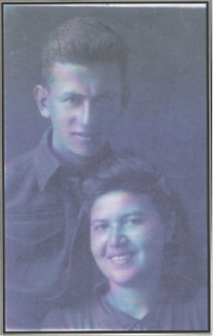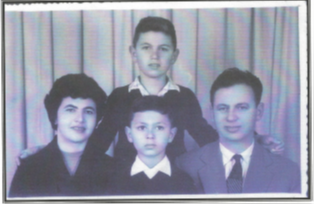Today begins Yom Hashoah - Holocaust Remembrance Day. To honor this day, I would like to share a family story.
This is a love story during World War II between my great-grandmother: Bronia, and my great-grandfather: Lova, whose memories are a blessing.
My great-grandmother: Bronia, shared her life stories with me and left us her handwritten notebooks. The story below is a translation from one of her many notebooks.
She also gave her Holocaust testimony in Yad Vashem.
My dream is to one day publish a book from those notebooks.
This is a small part of her life story and her journey.
My great-grandmother - Bronia, was born in 1922 in the town of Livni in Latvia and lived there until the age of 8. It was a small town with about 4000 inhabitants, all Jewish. The only people who could leave were the businessmen or people with money who could afford to go. In 1930, my great-grandmother's entire family moved to Riga, Latvia's capital. They did this with great distress as their house in Livni was passed down from generation to generation.
Upon moving to Riga, my great-grandmother entered the third grade in a nationalist school for non-Jews (many anti-Semitic students studied there).
After a while, she realized she was the only Jew in the school.
In June 1941, my great-grandmother finished high school and worked in a bank that the Russians had nationalized. Many people worked at the bank. They felt that the Germans were getting closer and were fighting with Russia over the annexation of Latvia. Every time the Germans shelled Riga, the Balts (Germans that lived in Latvia) in the bank clapped and sang nationalist songs.
Chaos began in the streets. The Russians blocked the roads. Jews were caught and beaten to death. My great-grandmother's mother gathered the whole family and announced they were leaving the house and would return when the bombing stopped. My great-grandmother was working at the bank, and she received a call to return home immediately, or they would leave without her and leave her behind. She ran home, but it was too late. The streets were all blocked, and no one was allowed to pass. She cried and begged, but they told her to leave and threatened her with guns.
My great-grandmother knew the streets of Riga well, and she used back alleys to get around the road closures. Eventually, she got back home in time. They left the house with her mother, two sisters, and brother. On the way, there was bombing everywhere. The streets weren't a safe place. They ran fast until they reached a train station. A train was supposed to take the Russian officers' wives home to Russia. Everyone rushed to the box office to buy tickets. There was terrible overcrowding on the train. People started throwing out suitcases and packages to make room for people. In the end, there was awful shelling, and everyone just entered the train through the windows and doors.
After a long journey, my great-grandmother's family arrived in Uzbekistan. They arrived at a Sovkhoz, which was a type of kibbutz. They were given a shack with two rooms. One bedroom had a wall-to-wall bunk bed, and a second room had one small one. In the small bed slept a newly married couple they hadn't met before. My great-grandmother's family stayed in the bedroom with the big bunk bed with two other girls from Poland.
Her sister Rebecca married shortly before the war and was given a separate room in different barracks.
My great-grandmother and her sister worked in the field, picking cotton. They did not know any Russian language. My great-grandmother could read but didn't understand much.
Not far from Sovkhoz, 6 km away, there was a cotton factory with many workers. One day a man from Poland became a manager there. He was in charge of distributing the pita bread portions to everyone. Now and then, he came to the restaurant in Sovkhoz. Around Sovkhoz, there were many lonely boys and girls from Poland. Their parents decided to send children to the Soviet Union until the end of the war, and the Nazis killed many children's parents. Since he was also lonely and all his family stayed in Poland, he looked at my great-grandmother's family with envy. He and my great-grandmother talked, and each told their story. He invited my great-grandmother and her sister to his office to sell them cheap soap, a costly commodity back then. And so slowly, my great-grandmother and great-grandfather fell in love, as much as it was possible to love amid war.
They got married. After the wedding, they were together for two weeks, and then all the Polish men were recruited to a Red Army labor camp. They were sent to Siberia in the cold of minus 40 degrees. My great-grandmother's husband (my great-grandfather: Lova) was also sent there. The job was to dig graves in a cemetery for the dead. Everyone who worked there ended up being buried there too. My great-grandfather knew some guys from Poland who traded all kinds of goods on the black market. He sold salted fish and earned a good amount of money until, one day; the police caught him. He was in prison but managed to escape. He knew a sick young man being released from the labor camp because of a terminal illness. My great-grandfather bought his release papers from him, changed his name (last name) from Zuprik to Gura, and became a new person. He traveled by train back to Uzbekistan but did not return to his former workplace because he was known by his old name there. He settled in the city of Kokand. He said he had lost the documents with his identity card, and they gave him a temporary identity card.
He worked for a truck driver as an assistant and learned to drive. He wanted to meet my great-grandmother as soon as possible and called the office in Sovkhoz and asked her to come to Kokand, where he was staying, in the only existing hotel. My great-grandmother was happy her husband returned and immediately went to the city. She arrived happily, running to the hotel, and asked about a guest with the last name Zuprik. They told her no guest or person with such a name had arrived at the hotel. My great-grandmother didn't understand why he stood her up after he called to meet with her and sent her all the love letters.
Meanwhile, it was getting dark, and she had nowhere to go. There were no rooms available to stay in the hotel. My great-grandmother begged the manager to let her sleep in the hotel, and he took pity on her and put a folding bed in a room with six girls. My great-grandmother returned home the following day sad. After a week, she heard knocking on the window in the middle of the night. It was her Lova. She opened the door for him, and he told her the whole story. He explained that he had to change his name to be able to come back. He waited for her at the hotel, but several police officers entered the hotel, and he was afraid they would come to arrest him, so he quickly left. That's why he came to her at night, so no one would recognize him. My great-grandfather went back to work in the city and occasionally visited Sovkhoz. My grandparents corresponded all the time by letters.
Riga changed a lot during the war. At the war's end, my great-grandmother's entire family returned to Riga, and my great-grandfather stayed behind. They received permission to return in exchange for a bribe. My great-grandmother heard from her husband six months after the end of the war.
Ultimately, they had two children: my grandfather Israel and his brother Shimon. They immigrated to Israel only after living in Poland for two years because it was impossible to immigrate from Russia. My great-grandfather Lova had a Polish identity card, which made it possible for them to live in Poland.
All of my great-grandfather's family were murdered in the Holocaust. He is the only survivor of his family. We didn't know his life story before he met my great-grandmother because he was never willing to discuss it.
A few years ago, my grandfather's brother, Shimon, found a picture of my great-grandfather's entire family in Yad Vashem standing in front of the shooting pit a few minutes before they were murdered.
I didn't get to meet my great-grandfather Lova. My great-grandmother used to talk about him a lot and describe him as the knight on the white horse who sent her love letters and whom she would look forward to seeing.
My great-grandmother was a phenomenal storyteller. Everyone was mesmerized every time she told her story. I was so moved to hear about the love between my great-grandfather and great-grandmother during such a challenging period and that, against all odds, they formed a warm and loving family.







